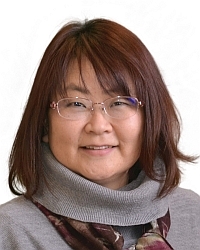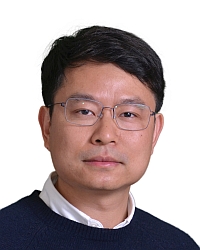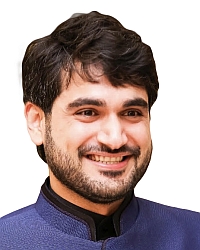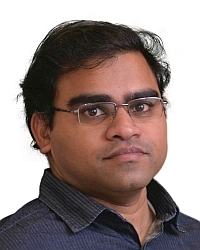TR2024-012
Wi-Fi based Indoor Monitoring Enhanced by Multimodal Fusion
-
- , "Wi-Fi based Indoor Monitoring Enhanced by Multimodal Fusion", IEEE International Conference on Acoustics, Speech, and Signal Processing (ICASSP), DOI: 10.1109/ICASSP48485.2024.10447600, March 2024, pp. 13296-13300.BibTeX TR2024-012 PDF
- @inproceedings{Hori2024mar,
- author = {Hori, Chiori and Wang, Pu and Rahman, Mahbub and Vaca-Rubio, Cristian and Khurana, Sameer and Cherian, Anoop and Le Roux, Jonathan},
- title = {Wi-Fi based Indoor Monitoring Enhanced by Multimodal Fusion},
- booktitle = {IEEE International Conference on Acoustics, Speech, and Signal Processing (ICASSP)},
- year = 2024,
- pages = {13296--13300},
- month = mar,
- publisher = {IEEE},
- doi = {10.1109/ICASSP48485.2024.10447600},
- issn = {2379-190X},
- isbn = {979-8-3503-4485-1},
- url = {https://www.merl.com/publications/TR2024-012}
- }
- , "Wi-Fi based Indoor Monitoring Enhanced by Multimodal Fusion", IEEE International Conference on Acoustics, Speech, and Signal Processing (ICASSP), DOI: 10.1109/ICASSP48485.2024.10447600, March 2024, pp. 13296-13300.
-
MERL Contacts:
-
Research Areas:
Artificial Intelligence, Computer Vision, Machine Learning, Signal Processing, Speech & Audio
Abstract:
Indoor monitoring systems are in high demand to protect vulnerable people, especially when they are alone at home, in nursing homes, hospitals, etc. Although surveillance systems in public spaces use cameras and microphones to find incidents, indoor monitoring in personal spaces needs to protect privacy. Such systems thus need to understand scenes without relying on direct sensing information, e.g., from audio-visual sensors, instead using indirect sensing information that is difficult to interpret by humans and may be insufficient to understand ongoing events precisely. To mitigate this draw- back, this paper proposes a new indoor monitoring approach that at- tempts to realize scene understanding using only indirect sensors by transferring the learned inductive bias of a multimodal fusion model trained using direct and indirect sensing information to a model that uses only indirect information during inference. We collected direct (audio-visual) and indirect (infrared and Wi-Fi) sensing information of indoor human actions in daily life and manually annotated event captions. We build models that can generate event captions from various combinations of indirect and direct sensor data, and show that our transfer learning approach leads to significant improvements in caption quality when only indirect information is used at inference time.
Related News & Events
-
EVENT MERL Contributes to ICASSP 2024 Date: Sunday, April 14, 2024 - Friday, April 19, 2024
Location: Seoul, South Korea
MERL Contacts: Petros T. Boufounos; François Germain; Chiori Hori; Sameer Khurana; Toshiaki Koike-Akino; Jonathan Le Roux; Hassan Mansour; Zexu Pan; Kieran Parsons; Joshua Rapp; Anthony Vetro; Pu (Perry) Wang; Gordon Wichern; Ryoma Yataka
Research Areas: Artificial Intelligence, Computational Sensing, Machine Learning, Robotics, Signal Processing, Speech & AudioBrief- MERL has made numerous contributions to both the organization and technical program of ICASSP 2024, which is being held in Seoul, Korea from April 14-19, 2024.
Sponsorship and Awards
MERL is proud to be a Bronze Patron of the conference and will participate in the student job fair on Thursday, April 18. Please join this session to learn more about employment opportunities at MERL, including openings for research scientists, post-docs, and interns.
MERL is pleased to be the sponsor of two IEEE Awards that will be presented at the conference. We congratulate Prof. Stéphane G. Mallat, the recipient of the 2024 IEEE Fourier Award for Signal Processing, and Prof. Keiichi Tokuda, the recipient of the 2024 IEEE James L. Flanagan Speech and Audio Processing Award.
Jonathan Le Roux, MERL Speech and Audio Senior Team Leader, will also be recognized during the Awards Ceremony for his recent elevation to IEEE Fellow.
Technical Program
MERL will present 13 papers in the main conference on a wide range of topics including automated audio captioning, speech separation, audio generative models, speech and sound synthesis, spatial audio reproduction, multimodal indoor monitoring, radar imaging, depth estimation, physics-informed machine learning, and integrated sensing and communications (ISAC). Three workshop papers have also been accepted for presentation on audio-visual speaker diarization, music source separation, and music generative models.
Perry Wang is the co-organizer of the Workshop on Signal Processing and Machine Learning Advances in Automotive Radars (SPLAR), held on Sunday, April 14. It features keynote talks from leaders in both academia and industry, peer-reviewed workshop papers, and lightning talks from ICASSP regular tracks on signal processing and machine learning for automotive radar and, more generally, radar perception.
Gordon Wichern will present an invited keynote talk on analyzing and interpreting audio deep learning models at the Workshop on Explainable Machine Learning for Speech and Audio (XAI-SA), held on Monday, April 15. He will also appear in a panel discussion on interpretable audio AI at the workshop.
Perry Wang also co-organizes a two-part special session on Next-Generation Wi-Fi Sensing (SS-L9 and SS-L13) which will be held on Thursday afternoon, April 18. The special session includes papers on PHY-layer oriented signal processing and data-driven deep learning advances, and supports upcoming 802.11bf WLAN Sensing Standardization activities.
Petros Boufounos is participating as a mentor in ICASSP’s Micro-Mentoring Experience Program (MiME).
About ICASSP
ICASSP is the flagship conference of the IEEE Signal Processing Society, and the world's largest and most comprehensive technical conference focused on the research advances and latest technological development in signal and information processing. The event attracts more than 3000 participants.
- MERL has made numerous contributions to both the organization and technical program of ICASSP 2024, which is being held in Seoul, Korea from April 14-19, 2024.




